Table of Contents
Marine CoLABoration Workshop - November 2015
The last Marine CoLAB workshop in 2015, held at the London Zoo on the 25th of November. Louisa Hooper compared it to standing at the seashore at low tide, with rocks and mud emerging from under water, when we can begin to see the peaks, as well as what lies beneath. One of the biggest challenges for this workshop and the year ahead is how to work more effectively with the resources available. The importance of keeping the big picture visible was emphasised, alongside the practicalities of projects, activities and campaigns.
In the morning the participants focused om Marine CoLAB as a whole. Beginning with a reflection on Marine CoLAB so far, looking at what has worked and what needs more work. Grounded in this experience they moved into a visioning process lead by Giles to clarify the Marine CoLAB vision and mission. At the end of the morning Sue took the group through a beautiful presentation and discussion of a values based approach, as a lens that can be used to shape and evaluate projects, experiments and the initiative itself. In the afternoon, the focus shifted to the Marine CoLAB project incubator, beginning with a broad mapping of existing and emerging projects by participating organisations which could be relevant to Marine CoLAB facilitated by Aniol. Two following sessions discussed the projects that emerged from previous workshops: possible directions for GameOn guided by Sandy and a working/planning session for the Plastic Bottles project lead by Heather. The day ended with a session about the future of Marine CoLAB in 2016.
Participants
Louisa Hooper, Heather Koldewey, Sandy Luk, Nicola Frost, Amy Pryor, Aniol Esteban, Giles Bristow, Sue Ranger, Mirella von Lindenfels, Sarah Ridley.
Facilitators: Maja Kuzmanovic, Nik Gaffney, Vali Lalioti
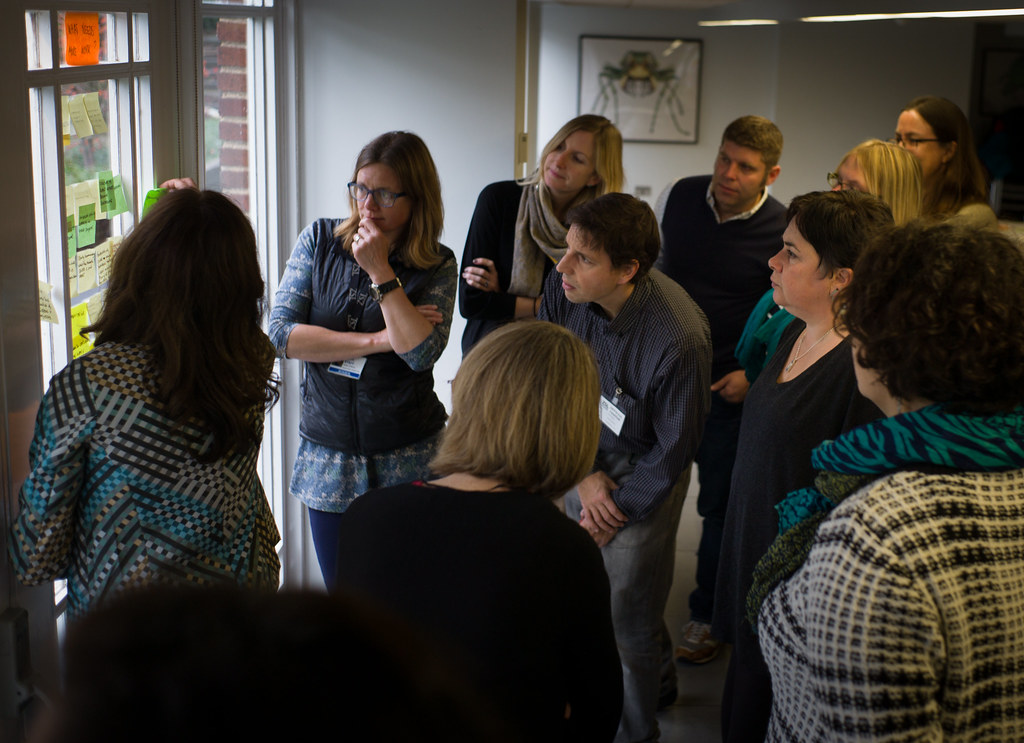
Marine CoLAB so far
The morning began by distilling a few points from previous discussions on the future of Marine CoLAB which can be used as a starting point or a point of discussion about Marine CoLAB in 2016 and beyond. Marine CoLAB participants are keen to seize opportunities, to re-frame challenges and refresh whole systems. They do this by being a part of trusted collaborations and networks. After a year of working together, the facilitators added that the participants are very keen to- and good at designing and working on projects.
At the very first workshop the participants designed a range of possible future scenarios for Marine CoLAB and the worlds in which it could exist. The different futures had two things in common: Marine CoLAB would be integrating values and innovation, as well as establishing and strengthening connections (between the ocean and society, between business and governments, bridging the gapes between local and global governance of oceans).
Over the course of several workshops, a range of challenges for Marine CoLAB were identified, including systemic change, public engagement, valuing (cultural dimensions) of oceans, perception of marine conservation, transparency of marine industries and plastic pollution of oceans. The facilitators observed an additional challenge: developing a sustainable support network beyond and in-between projects. This is something that began to be addressed in Lisbon and continues in this workshop.
Finally, before delving into the futures, mission, values and a range of experiments, projects and activities, we reminded ourselves of the CGF’s goal for Marine CoLAB: To communicate the role of the ocean for human wellbeing (particularly connecting natural sciences and economy).
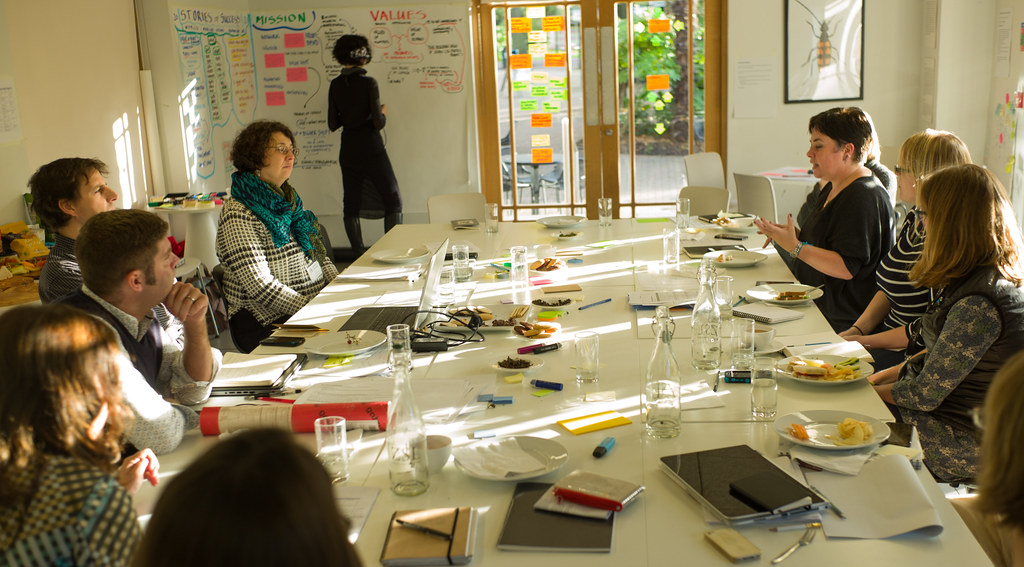
What worked?
People
- Supportive and energising group of people; Imaginative, energetic, energising and funny; Respectful; Genuine and committed people; Passionate, focused and willing to put in time when required.
- Open - want to be doing this; Openness of everyone in embracing something new
- Enthusiasm, engagement and energy of members during LAB meetings
- Broad range of skills, expertise and organisation; Balance of skills and knowledge
- Good balance of personalities
- Willingness to communicate
- Good size of group
- Good vibes!
Time & space to explore
- Flexibility, freedom
- Time spent together without explicit agendas/outcomes
- Thinking about issues from different perspectives
- Lack of territoriality and competition
- Building connections within the group
- Time, workshops to explore - facilitation has helped
- New dimensions brought in from CGF (e.g. other labs and communities)
- Workshops in stimulating environments - allowing us to think outside our daily / OP’s (?)
Community building
- Listening and finding out about different ways we create change
- A clearer sense of each other and the interests from our organisations
- We are trying to understand each others’ strengths and see how working together could add value
- Building a sense of vision and ambition
- The team is becoming more confidently creative and innovative - sharing and talking more - developing a TRUSTED network; Trust each other to share ideas, thoughts strengths and weaknesses - no territoriality
- Self-organising - members of the team are taking the lead on aspects of work - shared leadership
- Individual initiative starts the ball rolling (e.g. Heather - Plastics, Giles - Vision/mission, Sue - Values, Aniol - Incubator…)
- Finding a common project (e.g. Plastic pollution) to get our teeth into a specific challenge, that uses existing skills and interests - sum bigger than parts.
- Mix of work and social
- Developing new networks and relationships; Global → local networks
Support
- CGF: Hands-on engagement, support and guidance of Louisa and CGF, their agility and responsiveness (e.g. supporting conference attendance, networking)
- Facilitators: Support, facilitation and advance planning; facilitators help to keep on track; Capturing and documenting of what happened.
- Connections of the group to 'enablers' (e.g. Oak)
What needs more work?
Time!
- Time to deliver our potential of all ideas and projects
- Finding enough time to engage outside of project ideas that are not core business
- More time thinking and developing a framework for evaluation
- Retain energy over longer term; retain energy once in project delivery mode
- Communication between meetings; time to do things and connect between meetings (though it is happening); Embedding CoLAB work between workshops - often a last minute flurry of preparation for each one.
- Information overload - not always possible to digest what is shared
CoLAB
- Define a sense of direction
- Clarity of vision and objectives
- Application of value frame to other work
- Come back to CGF’s aim valuing the oceans and thinking about strategies to tackle this directly - not getting caught in the “project trap”, keeping our ambition at a “game changing” level; Avoiding silos and splits between different threads
- Developing ideas/projects on more underlying but important challenges (e.g. transparency)
- Identify the best skills and input a Marcolab project can give to specific needs
- Bringing in more of an “arts + culture” viewpoint
- Articulation of where Marine CoLAB fits with other initiatives
- Structure to support without becoming burdensome machine
- Need to figure out how to enable effective communication (between individuals, between the CoLAB and the organisations)
Communication and stakeholder engagement
- Clearly communicating what the Marine CoLAB is and does
- Connecting beyond the LAB, both with LAB organisations and other orgs.
- Promotion of ideas and approaches to wider community
- Connecting to other things happening at CGF: other projects and areas of work CGF supports + learning from other work CGF supported
- System to enable dissemination of thoughts and approaches and coalesce (?)
- (fishermen, mpa’s, pollution)
- Ability to integrate others in some aspects, without losing cohesion of the group
- Creative communications - communicating complex concepts, training…
Connect to organisations
- Dedicated staff
- In-house skills and capacity for four group projects
- Us as individuals in CoLAB vs us as organisation; thinking about organisational/institutional buy-in and engagement; using more of the entire skillsets of organisations (e.g. corporate responsibility, 'creative' legal approaches, etc.; connecting beyond individuals to others in our organisations; additional collaborators to deliver projects (buy-in); would like to draw on expertise of colleagues
- Understanding how to manage and maximise positive feedback into participating organisations
What can we improve?

Get better at knowing “who we are, where we go and how we do it”.
Organisational buy-in
- Engage not just individuals, but whole organisations in Marine CoLAB. This could be accomplished by:
- Clarifying the strategic lines of work of Marine CoLAB (3 lines?)
- Offering value add (e.g. building effective collaborations)
- Try to find a common agenda that all organisations would be interested in
- If Marine CoLAB activities can fit into day-to-day agendas of existing work in the participating organisations, more time can be freed to work on them
- Think about the structure of the collaboration and how it could overlap with organisational missions, activities and strategies.
Sustainability
- innovation
- collaboration
- projects
- Core funding is likely to be needed for Marine CoLAB as a whole, as some of the organisations are only funded on a project basis, so do not have the capacity to offer people’s time. While it is important to get Marine CoLAB projects funded, the benefit of the collaboration needs the CoLAB as a whole funded as well.
Communication
(within organisations, with stakeholders)
- Focus outwards
- Create a thought piece explaining something like “this is the benefit of 12 months of Marine CoLAB”, using the plastics project and other key outcomes as milestones. Communicate how Marine CoLAB affected ways of working, what effects it had on specific projects, potential long term value for oceans, etc.
Future of Marine CoLAB

The visions of Marine CoLAB in 2021
- Value is at heart of Marine CoLAB, connecting the public with oceans and increasing the environmental benefit. Value is also a challenge for Marine CoLAB, defining the rules of the game. The CoLAB is a framework that feeds the organisations involved with game-changing ideas and projects. It isn’t quite clear what the size of its pond is, but it is likely that its purpose is to think, or perhaps think and implement, more likely to connect and spawn initiatives rather than do everything itself.
- Marine CoLAB perpetuates change in three areas: governmental/governance, corporate and public awareness. In 2021 Marine CoLAB made the new biodiversity treaty possible, the planning of land and sea is integrated, there are now ocean ministers and ambassadors, aquatic carbon sinks have been established and new super-ports are operational. In the corporate arena Marine CoLAB was involved in successful collaboration with industries (plastic and others) and the world has seen significant carbon cuts. In terms of public awareness, the widespread and mutually beneficial engagement of people with oceans is increasing due to Marine CoLAB’s persistent efforts.
- Clarity about the added value of Marine CoLAB, for the organisations and the world. There is a clear articulation of strategy in three strands:
- Actual experiments that show change; including learning from the process, replicating and adapting experiments to other areas, developing metrics, etc.
- Good internal and external communication reaching broad audiences
- Values shift
Mission / MIX
Marine CoLAB is a network focused on values based solutions to protect and restore the ocean. We exist because a collective is a powerful means to address the urgent need for humans to value the ocean and drive change. We aim to achieve a shift in how the ocean is valued by individuals and society to improve ocean health. We tackle these issues by collaborating, incubating, innovating, catalysing and influencing.
- Value shift: what is Marine CoLAB’s theory of change? All participating organisations have one, but the glue could be the 'values based approach’
- Recognising existing values, rather than changing or creating 'new' values
- What is the timeframe?
Glue: values based → USP → what is the BIGGER SHIFT the lab wants to focus on (e.g. climate change, fossil fuels and oceans - a big goal to strive towards)? What are the relevant values for this goal? As a lab, how do we experiment with strategies? Is it economic transformation the Marine COLAB is looking for? Perceptual shifts, cultural change, or something else?
When talking about a values based approach, there could be two possibilities:
- Recognising and amplifying values: the CoLAB needs clearer ideas for methods to 'amplify' existing values. Behavioural change can be a result of recognising, uncovering & understanding existing values, as well as finding where values of oceans and people are at odds and experimenting with ways to make them not at odds any longer.
- Changing values: a more pro-active process, although perhaps an impossibility - possibly better to focus on changing behaviours instead.
To do in 2016 → look at values based campaigning Chris Rose and also NEF’s approaches.
Next steps
- Giles to compile a proposal for a mission statement based on these reflections and the materials from Lisbon.
( cross reference w. Giles' notes )
Values based approach

Presentation by Sue Ranger
There is a need to find a language all Marine CoLAB participants understand, paying attention to jargon. There is a difference between the term “values” and “value”, both are part of one whole, but can be understood quite differently. Sue’s presentation focused on values that connect people and places. What is important in a place? Values are developed through experience and interaction, and form the heartfelt connections between the people and a place, adding to human wellbeing. From these connections “cultural ecosystem services” beyond monetary value can be developed. They include a wider context, create whole ecosystems of interconnected disciplines (e.g. conservation, economy, mythology, wellbeing…) and incorporate different ways of talking and telling stories about a place. They deliver benefits to human wellbeing and are connected to other ecosystem services.
In order to uncover deeper values, we need to start with basic connectedness (of people and places, different disciplines…). This can form a glue, a common basis and shared understanding.
- developing a shared language based around values we can use to communicate within the group
- 'values of people' ←→ 'value of the oceans'
- uncovering existing values, aligning values
- issue based theory of change → value based
- bringing various voices, with various values into discussion
Discussion
The values based approach is the hallmark of Marine CoLAB, a prism or lens through which the LAB and its activities are designed and assessed. Filling the gap between the values of humans and the value of oceans. The value of oceans tends to be misunderstood and needs to be communicated differently. An iconic campaign might help, as well as focusing on issues by describing the value of oceans, such as the plastics project and other values based experiments, that would include learning, capturing, evaluation, etc.
There are different methods to approach values, depending on the theory of change applied. Should Marine CoLAB have one or more theory of change? Is there a generic TOC or a range of context specific theories that can mobilise new voices and gather evidence? Is the uniqueness of Marine CoLAB’s TOC important? Would it not be more relevant to focus on adding value?
What are the values of Marine CoLAB? Could shared values be Marine CoLAB’s focus at all times and across all projects? Is there a spectrum of existing values that are shared (instrinsic/extrinsic, economic & cultural, individual & collective, etc.)? By working with a range of different values this approach can focus on whichever value catalyses different target groups - starting from their existing values, connecting them to oceans and each other, making the values collective and shared.
How to begin using a values based approach in Marine CoLAB: learn by doing!
Next steps
- invite speakers
- share readings
- personal exercises (akin to Sue’s values presentation)
- incorporating it in projects
- values a part of all Marine CoLAB communication
Project Incubator
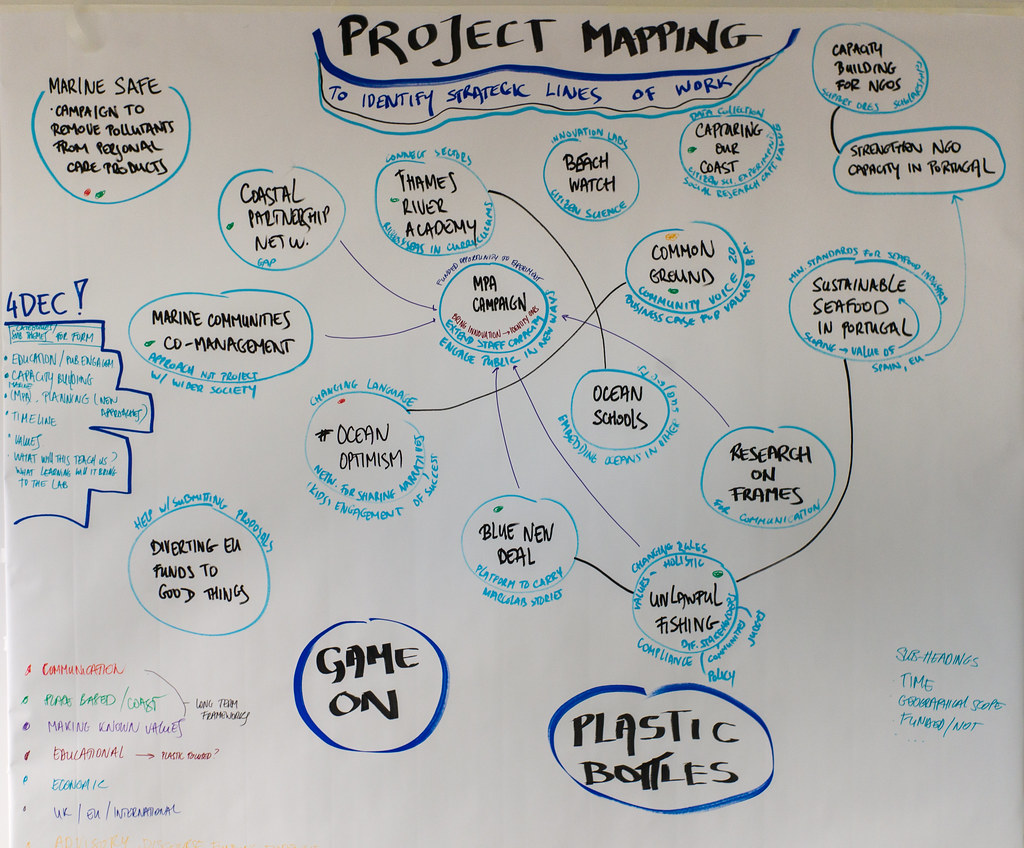
Mapping existing and emerging projects by organisations as a way to identify strategic lines of work for Marine CoLAB
The participants identified three main groupings for projects
- opportunities around MPA & spatial planning, policy related
- schools, training & educational projects
- exporting knowledge & support / capacity building
List of relevant projects
MPAs and marine planning
- Marine Safe; a campaign to remove pollutants from personal care products
- Common ground: Community Voice Project followup, business case for marine resource management
- MPA campaign/programme at MCS: increase in capacity for creating marine protected areas, funded opportunity to experiment, potential involvement of Marine CoLAB; engage public in new ways and extend staff capacity
- Sustainable seafood in Portugal, Spain and EU (NEF, MCS & Client Earth - reducing unlawful fishing; scoping, looking at minimal standards for the seafood industry; including different stakeholders (policy, communities, judges), starting from holistic values and working on changing rules and compliance
- Blue New Deal, a possible platform to carry MarCoLab stories.
- Coastal Partnerships Network, a possible vehicle for MarCoLab initiative trials, information dissemination and feedback nationally. UK Marine Planning is about to create opportunities for Coastal Partnerships to become individually more robust and realise ambitions for Integrated Coastal Zone Management. There are opportunities for the MarCoLab to play a central role in shaping the future of Coastal Partnerships and management on UK coasts with values at the heart of it.
Education and communication
- Thames river academy (educational projects) across different sectors, using rivers and seas as the bedrock of the curriculum and active environmental projects as the basis for transferable skills training.
- Ocean schools: ocean awareness as part of general knowledge, general education
- Beach Watch: citizen science and innovation labs
- Capturing our coast: citizen science, data collection and social research capturing value
- #oceanoptismism: a network for changing narratives around oceans → more focus on successes & communication of best practice
Capacity building
- Coastal Partnerships Network currently the Network is run voluntarily but there is a push to create consistency across each Coastal Partnership whilst retaining their local focus and delivery. Capacity needs to be built nationally to ensure marine and estuarine health is at the heart of all local development and economic decisions. The ambition is that each Coastal Partnership plays a neutral, honest broker role to ensure all sectors are involved in coastal management.
- Capacity building at FFI: new educational programmes, scholarships, masters, adult ed., support for organisations
- (FFI co-management approach)
- Related: strengthening NGO capacity in Portugal (Aniol)
- Diverting EU marine funding to 'good things' (European funding opportunities)
- http://www.frameworksinstitute.org/|Frameworks]] research
Next steps
- Aniol to compile & reformat existing info by end of the week, make a Project Incubator Form
- Edits, additions and value prompt to be submitted by Dec. 4th
- (cross reference these notes with Aniol's notes)
- Next workshop:
- Find specific ways for Marine CoLAB to inform or engage with existing and new projects (e.g. advisers)
- Write up value space for each project → further mapping
- Rethink projects in terms of value lens, changes of impact with contributions from other partners, possibly create a time-line and potential interactions between projects (dependencies….)
Game On!
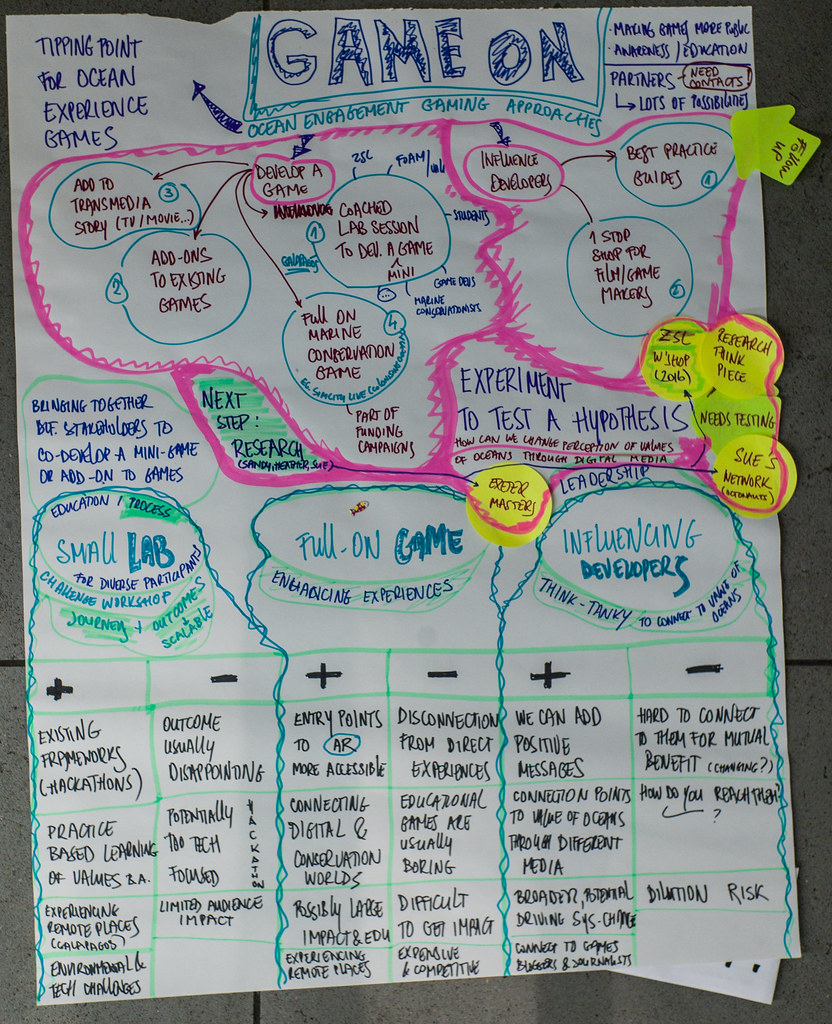
Ocean Engagement: gaming approaches
“We're close to a tipping point on ocean experience games”
Challenge: “how can we change perception of the value of oceans through digital media?” GameOn is an experiment to test the hypothesis that it is possible to do this by developing games or influencing game developers.
Several ides have surfaced, all with challenges and opportunities. The common challenge for all is deciding how and when to engage the pubic in the process, and who the target audience is (children, gamers, game developers…). It remains interesting to look at ways to make conservation games more mainstream, while at the same time focusing on awareness and education. There are many possible partners, but the CoLAB needs specific contacts and entry points to the games industry.
The first game on experiment focused on public engagement with rules related to oceans, which might be less game focused, perhaps more suitable as a training tool. Instead, it might be better to focus on more general 'ocean awareness'. So far it looks like there are two main possible directions:
- Develop a game (see below)
- Influence game developers: develop best practice guides, become a “one stop shop” or “think tank” for film makers and game developers… This approach would encourage leadership in design communities related to connecting transmedia stories to the value of oceans.
If Marine CoLAB would develop a game, different approaches are possible:
- Coached lab session or “challenge workshop” to develop (mini) game(s) and/or app(s) and add-ons to games, with different stakeholders. There is a possibility to conduct this experiment at ZSL, similar to 'fish hackathons'. The focus is on the process (journey) and education of diverse participants. Through the journey of a lab development session the participants create simple experiments to test the ideas and if successful, find ways to scale them.
- Develop add-ons to existing games
- Develop games as tie-ins to other games/films/etc (add to transmedia stories including BBC documentaries, Google Ocean, Natural Geographic programmes, etc)
- Develop a full-blown mainstream marine conservation game, e.g. a ’simcity-like’ versions of initial scenarios (from Workshop 1, or SIM_MPA (cf. beyond (..?) rising tide - maxis?). The interesting aspects of this approach is to enhance both digital games with marine content and experiences of oceans for the gaming community (e.g. using augmented reality).
Out of these directions, the group distilled three most promising options for progress and looked at their advantages and disadvantages:
Small Lab Games
- Advantages: existing format, easier to test assumptions with small games, practice-based learning of values; connecting environmental and technological challenges
- Disadvantages: does developing a mini game in a lab actually 'work' as a way to develop connections to the oceans? Hackathon process can be too technology focused, the outcomes can be lacklustre, with limited audience impact.
Marine Conservation Game
- Advantages: Making such a game would connect digital and conservation worlds; There is possibly large impact and educational opportunities, potentially reaching wide audiences, and amplification of Marine CoLAB messages. Augmented Reality (AR) tech becoming cheaper, easier to create and access (see existing research from BBC on AR in education). Added advantage: experiencing remote places without having to travel there (e.g. Galapagos with ZSL)
- Disadvantages high expectations, competitive market, difficult to create impact, cost of development is high, educational games are perceived as boring
Influencing Game Developers
- Advantages might be scope for a 'think tank' with more general (less issue/agenda based) consulting where Marine CoLAB can add positive messages, influence through others; connection points to value of oceans through different media; broader impact than developing a single game - potential for driving systemic change, for example by connecting to games bloggers and journalists
- Disadvantages: Hard to reach and connect this target group for mutual benefit (though this is slowly changing); Nemo effect' (clown fish), Disney often difficult to work with, span of control is extended, possible dilution.
Next steps
- more preliminary research to see which option is most promising
- Sandy, Sue & Heather: Potential research questions, masters topics for students of Exeter University: “next week” to draft a few paragraphs re. research scope etc. Envisaged results: a “research think piece”
- Heather: connect this experiment to the ZSL project on virtual Chagos (British, controversial, inaccessible), funding during 2016 for a workshop/lab/hackathon. This can be used as a test case for the “small lab games” approach
- Sue/MCS, probe existing contacts (Octonauts) as potential test audience.
(cross reference with Sandy's notes)
Plastics project
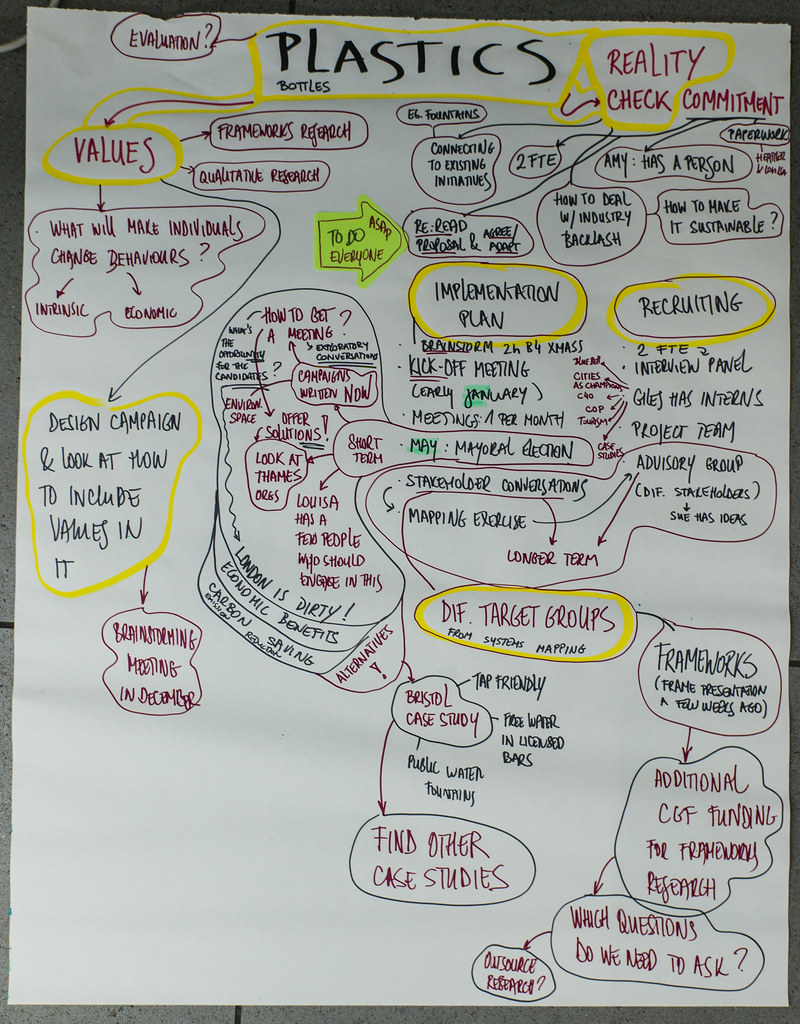
Working session of the now fully funded (CGF & OAK Foundation) Marine CoLAB project: campaign to make London free of Single Use Plastic Bottles.
Three topics to touch on:
- Values
- Reality check (commitments, plans)
Values
What will make individuals change behaviour (intrinsic, economic…)?
- Look at Frameworks research and qualitative research
- How to avoid industry backlash?
- How to make it sustainable?
- Focus as a marine project rather than just about 'rubbish'
- Have to have a closer look at what has failed in other projects to inform strategy
- how to ensure 'best advice' is maintained, front of house role?
- start compling hideous facts about single use bottles
- Design campaign to include values as an essential part of it: continue discussion at the brainstorming meeting in December.
- How to explicitly test values based research?
Reality Check
The funding proposal was successful: now a few urgent things to do:
- By 11 December 2015, All: Re:read the proposal, agree on commitments and/or adapt if needed.
- ASAP: Heather, Steve, Louisa: paperwork
Collaborative structure
- Project management at ZSL (via Project Oceans), narrative & communication TEP
- Governance: overview committee, advisory group - needs to be finalised
- Recruiting: By 16 December: Heather & Amy: draft job descriptions for 2 FTEs (and form an interview panel), advertise in December
- January: interview applicants
- Compile a project team ASAP
- Giles/FF: has staff for research & background, active mapping process. Connect FF’s interns to work on researching case studies (Bristol (tap friendly, public fountains…) Selfridges, ZSL, etc), C40, cities as chanpions, COP, tourism, Blue Bell…
- (Longer term): Form advisory group with different stakeholders (Sue has ideas)
Implementation plan
- 16 December: Initial startup meeting: Heather, Mirella, Amy, Giles, Louisa
- 12 January (from 2pm) Full planning meeting with other experts from organisations
- After January plan at least one meeting per month
- Short term focus: Mayoral election in May 2016: need strategy for mayoral candidates - Campaigns are written NOW (Louisa has a few people who should be engaged in this):
- How to get a meeting? Exploratory conversations to identify what is the opportunity for the candidates.
- Offer solutions/alternatives: economic benefits, carbon emission reduction, making London less dirty….
- Longer term: Systems Mapping exercise and stakeholder conversations (linked to advisory group)
- Identify target groups (from systems mapping)
- Outsource research: to e.g. frameworks research - additional funding will be available for this research from CGF. Which questions need asking?
- Link to related initiatives, e.g. “fountains for the future” project link (roll out in summer 2016), connections with existing NGOs working in 'plastics space'; e.g. Emma Cunningham re. stakeholder interviews, industry, NGOs, etc. Establish list of allies, existing contacts and relevant conversations, meetings required.
- Research any upcoming 'big things' to connect to (world cup, etc) esp. positioning for London?
Planning 2016
10 days of time per organisation is covered by CGF core funding for Marine CoLAB. How best to structure the time?
Marine CoLAB as a collaborative network
- What does a lab community look like?
- Collaboration as an improvement over competition for limited resources
- Added value of open thinking space, facilitated structure
- Further work required on values, strategy, project updates, planning, evaluation.
- 4~6 days of meetings of entire group
- some time for thinking about wider issues, larger context, incubation of vague ideas (cf. global strategy for sharks)
- What can we teach each other? Discuss learning which emerges from projects
- More focus on strategy, strategy work team, external communication
- To do: circulate set of objectives, further ideas towards a governance structure, business and operational models (next workshop early 2016)
Marine CoLAB Activities / Projects
- Smaller, structured meetings around particular topics/projects
- Aggregating projects (from existing/emerging projects mapping), work-streams on specific project (now: Plastics)
- Clarify criteria for 'a lab project'
Communication and stakeholder engagement
- Time to proactively communicate!
- Clarify evidence base for the lab, both process and projects
- How can new/other partners get involved in the future? Strategy for engagement?
- Better integration of partners into project proposals → more explicit collaborations
Next Steps
07/12 Fill in the Project Incubator Form.
- The form and questions can be found here: http://lib.fo.am/marine_colab/project_incubator_form
- → Send to Aniol
11/12 Re-read the proposal, agree on commitments.
- → Send to Heather
16/12 Plastics project working meeting (Marine CoLAB only).
- → Let Heather know if you’re coming.
24/12 Write a few paragraphs describing the benefits of Marine CoLAB
- e.g. How did it affect ways of working, key outcomes for you, effects it had on specific projects, long term value etc.
- → Send to Louisa.
Dec. GameOn: Potential research questions and masters topics
- → Sandy, Heather, Sue
- → Heather: connect GameOn to 'virtual Chagos' (w/shop in 2016)
- → Sue: probe contacts (Octonauts) as potential test audience
Dec. Plastics:
- Project implementation plan, timeline, external deadlines;
- Establish list of contacts, setup meetings
12/01 Plastics: Planning meeting with experts from organisations (2pm)
Before the next workshop
- Circulate set of objectives for Marine CoLAB in 2016 and beyond
- Collect ideas towards a governance structure & business models
- Mission: Giles to send the mission statement for review to all
- Values:
- Share reading on this topic online: http://lib.fo.am/marine_colab/recommended_reading
- Invite speakers (e.g. Chris Rose, Frameworks…)
During the next workshop
Values based approach
- All: present your approach to values connecting humans and oceans
- Values based approach as the hallmark of the Marine CoLAB Strategy
- Values a part of all Marine CoLAB communication
- Rethink projects in terms of value lens
Vision, Mission, Strategy for Marine CoLAB network
- Finalise work from previous workshops
- Discuss business, governance and operational models (incl. best practices from CGF)
Project Incubator
- Discuss how to inform or engage with existing and new projects
- Further mapping; Contributions from other partners, possibly a time-line and potential interactions between projects (dependencies…)